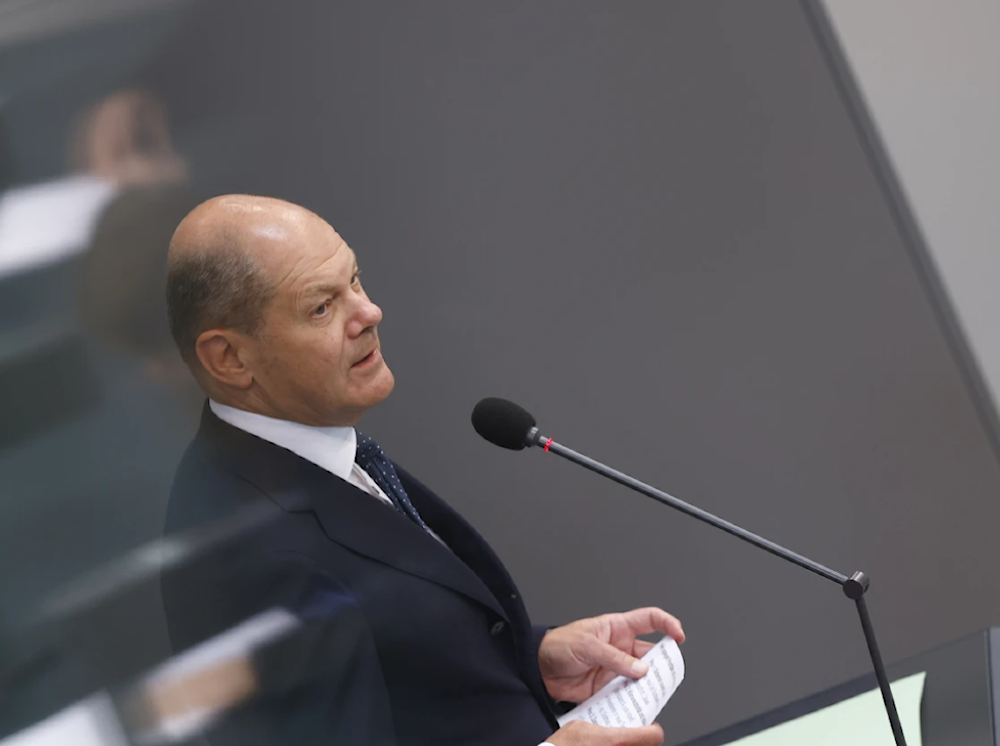Germany meets the 2% NATO budget goal for 1st time since Cold War
According to NATO records, Germany has not spent 2% of its GDP since 1992.
-

German Chancellor Olaf Scholz speaks during a meeting of the German federal parliament Berlin on July 5, 2023. (AP)
Germany has met a NATO defense expenditure target of 2% of GDP for the first time in 30 years, according to German news agency DPA, citing sources in Brussels.
This equates to a total of $73.41 billion, an absolute record for Germany. According to NATO records, Germany has not spent 2% of its GDP since 1992. During the Cold War, this percentage was generally higher than 3%.
NATO defense expenditures will be debated on February 15 during a meeting of NATO defense ministers in Brussels. Approximately 20 of the alliance's 31 members are projected to reach the objective this year.
Last week, NATO's Secretary-General, Jens Stoltenberg, urged European nations to enhance their arms production to aid Ukraine and avert the possibility of a prolonged confrontation with Moscow.
In an interview published by German media ahead of a crucial NATO defense ministers meeting in Brussels and the second anniversary of the war in Ukraine, Stoltenberg stressed the necessity of swiftly rebuilding and expanding the industrial base to accelerate deliveries to Ukraine and replenish NATO's supplies.
"This means shifting from slow peacetime to high-tempo conflict production," he said, as quoted by the German Sunday daily Welt am Sonntag.
Stoltenberg's remarks coincide with escalating requests for shells, ammunition, and additional military support from Ukraine. Western leaders, including Germany's Chancellor Olaf Scholz and President Joe Biden, have joined the chorus, pressing US lawmakers on Friday to endorse a long-awaited military aid package for Ukraine. They emphasized that without this assistance, Kiev would be unable to withstand the ongoing war.
"The failure of the United States' Congress in not supporting Ukraine is close to criminal neglect," Biden said as he hosted Scholz in the Oval Office on Friday.
Stoltenberg said, "There is no imminent military threat against any ally. At the same time, we hear regular threats from the Kremlin against NATO countries."
The war in Ukraine nearly two years ago has shown that "peace in Europe cannot be taken for granted," the NATO chief said, stressing the importance of "protecting" countries in the alliance.
"As long as we invest in our security and stay united, we will continue to deter any aggression," he said.
German FM describes German economy as an 'unfit man'
Finance Minister Christian Linder stated at the London School of Economics on Monday that Germany needs structural reforms to boost its competitiveness.
This came after Germany was declared by the IMF as having the weakest performance among large economies in the world and was labeled once again “the sick man of Europe”.
Linder objected to this label, stating that “some say Germany is the sick man of Europe, I don’t think so,” adding “we are an unfit man.” The “sick man” label was famously given to Germany by The Economist in 1999 as the country struggled with the challenges of reunification and reduced export demand.
The German economy has shrunk by 0.3% year-on-year in 2023, as energy costs have risen, global orders have dulled, and interest rates have increased.
The IMF expects the German economy to grow by only 0.9% in 2024, well below the 1.4% predicted for advanced economies.
Linder further stated that Germany is “healthy, but not in the best shape,” while comparing the German and UK economies which he believes “both are in a downturn.” He previously compared Germany to a “tired man” in need of a cup of coffee of structural reforms, last month.
“It is unlikely that any economy is capable of paying subsidies for a very long time,” Linder said in an attempt to stress his belief that the EU requires a single capital market for private investment replacing endless subsidizing.

 4 Min Read
4 Min Read









